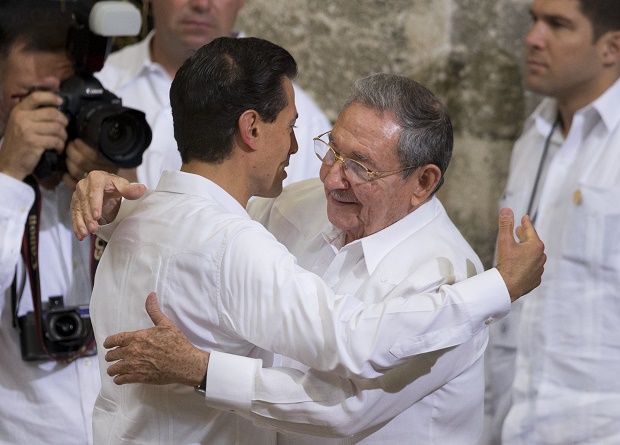Castro, Pena Nieto seal warmer Cuba-Mexico ties

Mexican President Enrique Pena Nieto, left, hugs Cuban President Raul Castro, as he arrives for an official welcome ceremony at the Yucatan State Government Palace in Merida, Mexico, Friday, Nov. 6, 2015. The presidents of Mexico and Cuba stressed mutual interests and admiration on Friday, announcing new accords and closer political ties after more than a decade of chilly relations. AP Photo
MÉRIDA, Mexico—Cuban leader Raul Castro received a warm welcome in Mexico on Friday as President Enrique Pena Nieto sought to end a diplomatic chill and boost business opportunities on the island.
READ: Cuba’s Raul Castro visits Mexico to relaunch ties
With the colonial Caribbean city of Merida serving as the backdrop, Castro was given red carpet treatment at the Yucatan state government palace for his first official visit to Mexico since taking power in 2006.
“Long live the indestructible brotherhood between the people of Cuba and Mexico,” Castro said as he delivered a speech alongside Pena Nieto following a private meeting.
Article continues after this advertisementFor his part, Pena Nieto greeted Castro with an embrace and told him that “Mexico welcomes you with open arms.”
Article continues after this advertisementThe two governments signed five cooperation agreements in migration, education, diplomacy, fishing and tourism.
Both leaders made clear that the improved relations could lead to more investment opportunities for Mexican companies as the communist nation implements economic reforms.
“We committed both our governments to creating the conditions for Mexican businessmen and investors to invest in Cuba,” Pena Nieto said.
“In Mexico, we value the new opportunities that are emerging in Cuba and we want to be an ally in this process of change.”
Cuban migration surge
The diplomatic reconciliation between the United States and Cuba has raised the prospect of new business opportunities on the island, though the US embargo remains in place.
In May 2014, Mexico sent a business delegation to Havana representing 48 companies. It also opened a trade promotion office in Havana.
Mexico has several investment projects in Cuba’s Mariel mega-port.
“We are pleased by the interest that Mexican companies have in doing business and investing in Cuba, especially at the special development zone of Mariel and in sectors like agriculture and tourism,” said Castro, who returns to Havana on Saturday.
In his bid to improve ties since taking office in 2012, Pena Nieto forgave 70 percent of Cuba’s $487 million debt in 2013 and held a state visit in Havana a year later.
The US-Cuba rapprochement has had another effect for Mexico, as thousands of Cubans have been entering the country on their way to the United States.
The surge is driven by fears among Cubans that the US-Cuba detente will prompt Washington to stop giving them automatic visas when they step on US soil.
Mexican government figures show that nearly 6,500 Cubans were taken to migration centers in the first nine months of this year, three times more than in all of 2014.
Pena Nieto said the two governments signed an agreement to broaden legal tools to ensure a “legal, safe and orderly” flow of migrants between both countries, and combat human trafficking.
‘Eat and leave’
Castro’s visit sealed a warming of relations between two nations that have had close ties in past decades.
Relations were marked by tensions between Fidel Castro and conservative Mexican governments that were in power from 2000 to 2012.
Ties were better when Pena Nieto’s Institutional Revolutionary Party (PRI) was in power for much of the 20th century.
The Castro brothers lived in exile in Mexico in the 1950s and sailed to Cuba from the eastern state of Veracruz to launch their guerrilla revolution.
Mexico was the only Latin American country to resist US pressure to break relations with Havana during the Cold War.
But relations turned sour under Vicente Fox’s 2000-2006 presidency, which voted to condemn Cuba at the UN Human Rights Council.
At a UN poverty summit in the northern Mexican city of Monterrey in 2002, Fox urged Fidel Castro to “eat and leave” early to avoid an awkward encounter with then-US president George W. Bush.
“It’s very good that relations between Mexico and Cuba are normalizing, but it’s not as important as in the past for either country,” said Rodrigo Salazar, political expert at the Latin American Social Sciences Faculty.